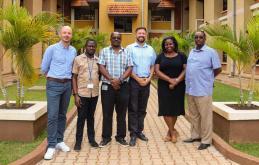Well, that went by fast! It seems like only yesterday I was working for a global credit card company, back in a small office cubicle in grey Brussels. It wasn’t long after starting my job there that I realized that a career in the financial sector wasn’t a fit for me in the long run.
While I might have been physically in Europe, I often had an interest in working in an African country. I also wanted to contribute my time, skills and knowledge to a more meaningful cause – something I couldn’t quite figure out how to do in the private sector. When an opportunity to serve as a UN Volunteer at the UN Regional Service Centre Entebbe (RSCE) in Uganda came along, I knew that I had to grab it with both hands.
During my first couple of days at the RSCE, I didn’t fully understand what the Regional Service Centre Entebbe does. A shared service centre? Who do we service? Now, just over a year into my UN Volunteer assignment, I fully understand why the RSCE was created and its massive importance for the 21 client entities it serves.
The RSCE provides administrative and operational support to UN peacekeeping operations and small political offices across Africa. These operations and offices are often located in places experiencing conflict and violence, which means that the working conditions for UN staff are extremely hard. Seeing the UN’s peacekeepers, blue helmets, police officers and other UN field staff work in these incredibly tough circumstances, the UN decided to establish the RSCE in 2010 in order to better support staff in the field.
I like the fact that UN Volunteers perform real work – work that is essential for the successful completion of the department’s annual work plan. I also appreciate the chance to have an insider’s look at how a UN Secretariat office in East Africa goes about its everyday business. --Yannick Van Winkel, UN Volunteer Communications Officer, RSCE, Uganda
To lighten the burden of our colleagues in harsh peacekeeping posts, such as in the Democratic Republic of the Congo, Sudan, South Sudan, Somalia, Mali and the Central African Republic, among others, all administrative, logistic, communication, and technology services that can be performed independent of location are done at the Regional Service Centre in Entebbe.
This way, colleagues in the field can concentrate on their peacekeeping tasks, while the RSCE team makes sure that our peacekeepers’ travel reservations are in order or that they get their monthly wages on time – just two of the “outsourced tasks” that the RSCE performs for its client missions. (For more information on RSCE’s activities and the numbers behind them, check out this infographic).
As a communications officer within the Communications Unit of the RSCE, I am grateful to actively contribute to Sustainable Development Goal 16 (SDG 16): Peace, justice, and strong institutions. I’m proud that my work in collaboration with 400+ RSCE colleagues adds an extra, tiny layer of comfort and support to those UN staff members in tough duty stations. Our work at the “silent giant,” as RSCE is known, allows them to keep on serving the UN’s mission in this region, to continue doing their vital peacekeeping work, day in and day out.
From the start, I felt like an integral part of the communications team. In our small but smoothly run unit of five, two of us are UN Volunteers. The open corporate culture encourages us to work together closely and in good spirit with each other, which has proven to be indispensable. At RSCE, UN Volunteers receive the similar professional responsibilities, workload, and duties as other UN staff counterparts. I like the fact that UN Volunteers perform real work–work that is essential for the successful completion of the department’s annual work plan.
There’s no way for one to fully have grasp how the UN functions among its numerous subsidiary entities, offices, and agencies without having spent some de facto internal time within the organisation – as a UN Volunteer for instance.
Something I did not anticipate when I started this journey a year ago, is that I would have to work remotely. This year, I’ve spent about two-thirds of my UNV experience working remotely due to the precautionary safety measures taken by RSCE management in order to limit the spread of COVID-19 among staff. While it’s has made our work a little difficult, we are making the most of the current circumstances.
Would I recommend becoming a UN Volunteer? Would I tell you to chase an opportunity to create a positive impact? Would I advise you to take the chance to be a force for achieving peace and development? Most definitely, yes! My UNV experience has certainly changed my life and perspective in terms of finding a balance between working both for an income and for the betterment of the world we all live in. --Yannick Van Winkel
As I begin the second year of my UNV assignment, I’m brought back to how I started this reflection: these past 12 months have been nothing less than a whirlwind! I’ve been able to do the kind of work I believe I was born to do, I’ve met many remarkable people, both inside and outside of work, and I feel like I’m doing my part, however small, to carry out the UN’s vision for international peace and security.

